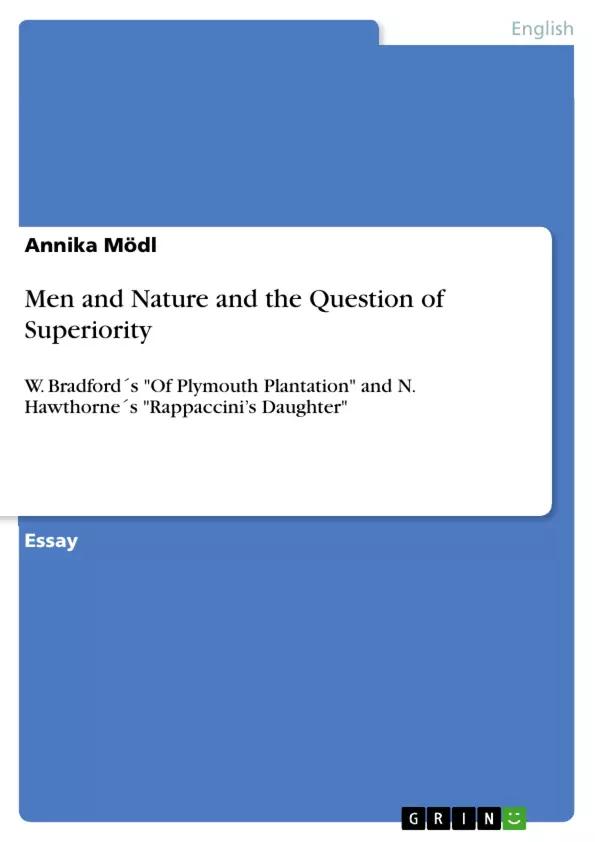Those two texts were written more than 200 years apart from each other and at first sight they seem to deal with very different topics: the first settlement in America through the Puritans and the story of an Italian scientist and his momentous experiment. However, there is a motive that both texts share: nature. The relationship between man and nature differs in "Of Plymouth Plantation" and "Rappaccini’s Daughter". Both texts are products of the literary periods they were written in: Bradford´s narrative embodies the Puritan era, as he was one of the first Pilgrims who came to the new land. From a Puritan point of view, it was God who protected the English from this wilderness, or at least those who deserved it. Additionally, God is providing food and pleasant weather for his chosen people, to support them on their way to their new home. The text also shows that the Puritans are chosen by God to settle in their promised land, and therefore are allowed to use the nature however they want, or need to. Hawthorne, as an author of Dark Romanticism deals with imagery of nature too, but with a different purpose: The story of "Rappaccini´s Daughter" shows, in a cruel way, what happens if people want to rule over nature and manipulate it with science. It is not only the beauty and spiritual meaning of nature that played a big role in Romanticism, but Hawthorne goes one step further to show the cruelty and power of nature. The story illustrates how scientific manipulation can turn nature, in this case the flowers, into something terrifying for both, nature itself and the people.
Inhaltsverzeichnis (Table of Contents)
- Men and Nature
- Puritan Era
- God's Providence in Nature
- Puritan's Power Over Nature
- Dark Romanticism
- The Effects of Nature Manipulation
- Beatrice as a Metaphor for Nature
Zielsetzung und Themenschwerpunkte (Objectives and Key Themes)
The text aims to explore the contrasting relationships between man and nature as depicted in two literary works: William Bradford's "Of Plymouth Plantation" and Nathaniel Hawthorne's "Rappaccini's Daughter". The two texts, written in distinct periods, offer different perspectives on the theme of nature and its impact on human life.
- The role of God's providence in nature
- The power of man over nature
- The dangers of manipulating nature through science
- The interconnectedness of humanity and nature
- The consequences of neglecting the beauty and value of nature
Zusammenfassung der Kapitel (Chapter Summaries)
The text analyzes the differing depictions of nature in "Of Plymouth Plantation" and "Rappaccini's Daughter". In Bradford's work, nature is viewed through a Puritan lens, with God's presence and power being evident in the natural world. The Puritans' journey to the New World is seen as a testament to God's protection and guidance, as they face harsh weather and a wild landscape. The text highlights the pragmatic approach of the Puritans, who utilized nature to meet their needs for survival and settlement.
In contrast, Hawthorne's story explores the dark side of human manipulation of nature. Rappaccini's scientific experiments result in the creation of dangerous, poisonous flowers that symbolize the consequences of interfering with nature's balance. The text examines the interconnectedness of humanity and nature, exemplified by Beatrice's transformation into a poisonous being due to her upbringing in the poisonous garden. The narrative serves as a cautionary tale against manipulating nature for personal gain, emphasizing the importance of appreciating and cherishing the natural world.
Schlüsselwörter (Keywords)
The text focuses on themes of Puritanism, Dark Romanticism, nature, God's providence, human manipulation, scientific experimentation, interconnectedness, beauty, and the consequences of disregarding nature's intrinsic value. The analysis delves into the contrasting perspectives of Bradford and Hawthorne, highlighting the importance of understanding different historical and cultural contexts when interpreting man's relationship with nature.
Frequently Asked Questions
How do Bradford and Hawthorne differ in their view of nature?
Bradford sees nature through a Puritan lens as God's providence, while Hawthorne, a Dark Romantic, portrays it as a powerful force that can become terrifying when manipulated by science.
What is "God's Providence" in "Of Plymouth Plantation"?
It is the belief that God actively protects and provides for the Puritans in the wilderness, granting them food and favorable weather for their settlement.
What are the dangers of scientific manipulation in "Rappaccini’s Daughter"?
Hawthorne shows that trying to rule over nature through science can turn beauty into something poisonous and destructive for both nature and humanity.
How is Beatrice a metaphor for nature?
Beatrice represents the interconnectedness of humanity and nature; her transformation into a poisonous being reflects the corruption of natural beauty by human interference.
What characterizes Dark Romanticism's view of nature?
Unlike light Romanticism, it focuses on the cruelty, power, and darker spiritual meanings of the natural world, often highlighting the consequences of human arrogance.
- Citation du texte
- Annika Mödl (Auteur), 2013, Men and Nature and the Question of Superiority, Munich, GRIN Verlag, https://www.grin.com/document/276756



